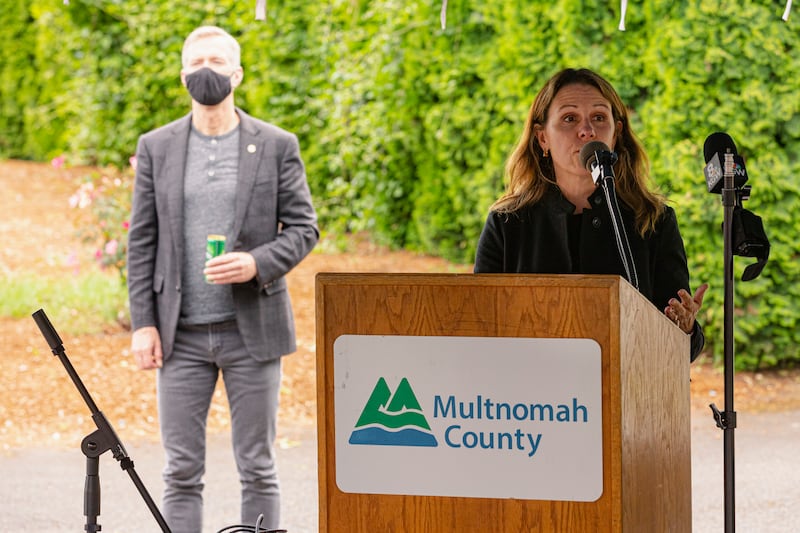In a surprising pivot on May 27, Multnomah County Chair Deborah Kafoury and City Commissioner Dan Ryan pledged to work together to provide immediate assistance for unhoused Portlanders.
Their joint statement signaled a cease-fire in the war of words between city and county officials over whether to direct taxpayer dollars toward permanent housing placement or temporary shelters in a city where tents have become shorthand for a humanitarian disaster.
Kafoury tells WW she wants to put disputes behind her. “Asking me to weigh in on someone else’s motivation or morality,” she says, “is designed to pit us against each other and make this about politics instead of about the people surviving outside.”
Fair enough: The key to whether the truce will help people survive now lies in the details of Ryan’s plan for “safe rest villages” dotting the city that include hygiene services and case management.
Such sleeping sites were the proposal that mayoral aide Sam Adams pitched to law partners last month as a destination for people currently sleeping in front of downtown office towers. Three weeks later, the idea has gained traction among nearly all the key parties needed to make it a reality.
In a stakeholder meeting on May 28, Ryan offered up a few more details and received the glowing praise of Kafoury, Mayor Ted Wheeler and County Commissioner Sharon Meieran—three elected officials who haven’t agreed on much recently. But in that meeting, housing nonprofit leaders expressed deep doubts about the fine print of the plan—urging Ryan to consider more robust mental health and addiction services for those living in the villages, warning that the idea could flop if wraparound services aren’t offered.
Here’s what we know about the villages, and what we don’t.

WHAT WE KNOW
In the meeting last week, Ryan expanded on his plan: Build at least six safe parking villages or safe sleeping villages across the city with case management and hygiene services.
Ryan says the city is in the process of identifying parcels of land, and adds that the Portland City Council will vote June 7 on an ordinance to move the plan forward.
Ryan tells WW construction of the sites will start in September, and the goal is to have six villages built by the end of the year.
“These villages will provide essential baseline services: laundry, hand-washing stations, showers, porta-potties and common areas for food and dialogue, as well as case management provided by contractors through the Joint Office [of Homeless Services],” Ryan said in an email.
Backlash from neighborhoods near such campsites has historically scuttled similar dreams. But Ryan says the response from neighborhood associations was surprisingly amicable. “The enthusiasm from communities of faith and a lot of neighborhood associations, [there was] more unification than I would’ve expected and it made it a lot easier,” he said in the May 28 meeting.
The city plans to use a portion of its American Rescue Plan funds for the project. Ryan’s budget? “The number I’m holding onto is $20 million as a ballpark number.”
It’s also clear that city and county leaders feel pressure to create these villages because business groups are eager to remove tents from downtown sidewalks.
Last week, the Portland Business Alliance sent a letter to Kafoury asking that she fund 500 extra shelter beds. The chamber of commerce invoked the landmark Martin v. Boise ruling, which says a local government cannot criminalize homelessness if it isn’t providing enough shelter for unhoused people. (It’s unclear how much the letter increased the pressure on the city and county to come to an agreement.)

WHAT WE DON’T KNOW
Many things! The known unknowns include: where the sites will be; whether they will include housing structures or simply spaces for camping in cars and tents; and whether the sites will offer resources like mental health and addiction services.
We also don’t know the capacity of each of the envisioned sites or how long people can stay.
Nonprofit housing leaders who work directly with homeless people are already voicing apprehension about the details.
Katrina Holland, executive director of JOIN, warned at the May 28 meeting that “when we do these camps and assume they’re managed, be sure there’s resources on site to proactively address behavioral issues and moments of crisis.”
“One thing that alarmed us when we were told of this idea…my understanding is part of the effort is to decrease some of the public health concerns and public visualizations of folks living on the street,” Holland said. “However, if we don’t have support for folks who are experiencing substance abuse, when they get to those campsites, not having that support can be really detrimental.”
In other words, Holland fears that people at the sites could find conditions there worse than camping beside the road—but out of the public’s sight, which would please business interests but not help the unhoused.
Two other advocates chimed in, expressing deep concern that if the sites didn’t offer mental health support, addiction programs and other wraparound services, they could quickly go awry—and perpetuate the churn of homeless people returning to the streets.
Those same advocates advised city and county leaders to choose between self-managed and managed camps—not create a hybrid model. Holland said she’d recommend self-managed camps, like Dignity Village.
Commissioner Meieran urged the county’s participation: “It’s the perfect opportunity for the county to provide the wraparound services at these safe sites so that they’re supported by harm reduction and behavioral health services, something that is so critical in this whole continuum.”
